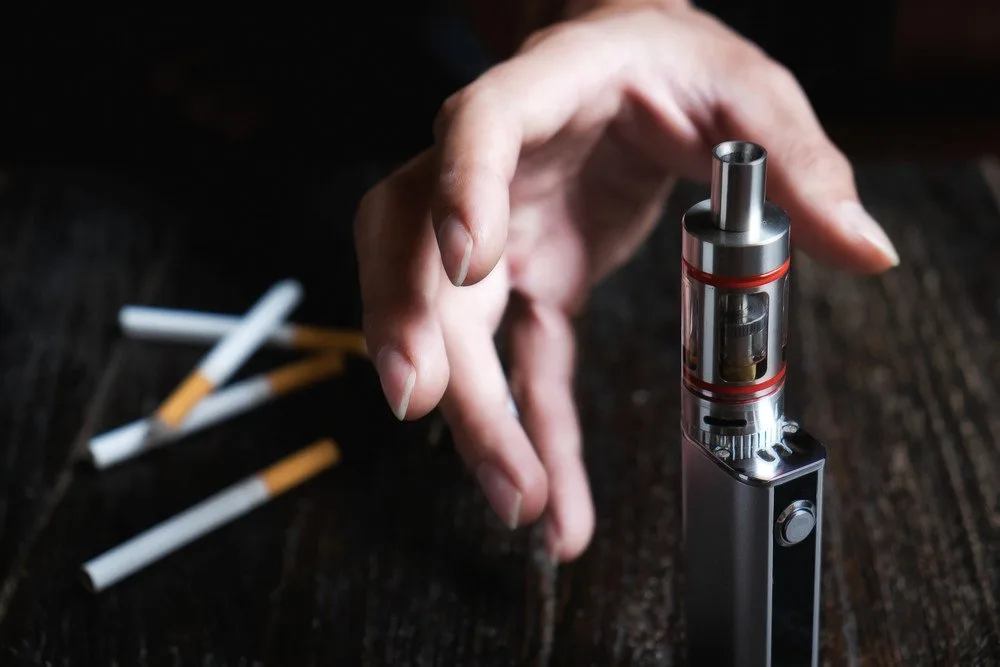Vaping is the modern-day cigarette that boasts tasty flavors and affordability – a total contrast to its tobacco and combustible counterparts. It’s grown in popularity under the deceptive guise of a healthier alternative to standard smoking, due to the absence of cancer-causing tobacco. Therefore, our health ought to be in the clear, right? Wrong.
It turns out that vaping is still not a safe option, despite the glamorized marketing that surrounds it. Certainly, some vape users may be on the fence about quitting this novel way of smoking. That being said, a new study could potentially compel them to kick the practice to the curb.
Vaping spurs addiction like cigarettes, but what about lung damage?
Vaping is a relatively new product, but people (especially the youth) have become increasingly dependent on it. As of 2023, more than 2.1 million American youth currently use e-cigarettes, and more than 1 in 4 of them use these products daily. Accordingly, researchers are investigating the long-term impact.
A dilemma lies in the way vaping is often marketed. Users are led to believe that it’s health-enhancing because it is advertised alongside words like “natural”, “vitamin”, and “organic”. Nonetheless, these messages are false. Firstly, e-cigarettes, much like ordinary cigarettes, still contain nicotine – the compound that stimulates addiction. This, in and of itself, is problematic.
As Andrew Huberman says, “Addiction is the progressive narrowing of the things that bring you pleasure”. Largely, compulsions tend to interfere with your functioning in other areas of your life. According to an article published in 2020 by the National Institute on Drug Abuse, people with addictions are often met with one or more correlated health issues. Well, as per the latest research conducted by Concordia, a vital membrane in our lungs is the collateral damage of a vaping habit.
Additives in vaping devices have serious health consequences
The findings have provided input to the growing body of literature on “EVALI”. Electronic cigarette or vaping product use-associated lung injury (EVALI) refers to the lung disease that can develop because of vaping. In terms of what the study has shown, e-cigarette additives, namely tocopherol (or Vitamin E) and tocopherol acetate, appear to do our breathing a disservice. “How?”, you may ask, “these are natural additives”. Let us explain.
Vaping devices heat these compounds to create a vapor – which you then inhale. But the problem comes when the Vitamin E and Vitamin E acetate implants in the lung surfactant.
This is a thin membrane, made from proteins and lipids, that covers the surface of the alveoli (small air sacs found at the end of the “respiratory tree branches” in our lungs). Effectively, these balloon-shaped structures are responsible for exchanging oxygen and carbon dioxide in the bloodstream during inhalation and exhalation.
Moreover, the lung surfactant eases the work of breathing by stabilizing the lungs’ surface tension, preventing collapse. In that regard, the alveoli (along with its surfactant) clearly play a crucial role in the body’s respiratory system. So it’s incredibly alarming that vaping is implicated in its impairment.
How was the research conducted?
The Concordia researchers used model membranes (called Langmuir films) to mimic the expansion and contraction of the lung surfactant. From there, they added incremental amounts of the Vitamin E additive to it. They used a variety of observational techniques and found that the properties of this simulated surfactant changed the more Vitamin E they added.
These findings suggest that the presence and retention of Vitamin E (from vaping) interferes with the job of the lung surfactant. Consequently, this alters our lungs’ ability to exchange gas, along with the exercise of stabilizing during breathing. This makes sense since those who suffer from EVALI tend to experience shortness of breath and reduced oxygen levels.
E-cigarettes may spare the bank accounts of youngsters, but not their health
Vaping has secured a steady appeal to younger generations – with combustible cigarette usage taking a knock over the years. The Youth Risk Behavior Survey revealed a stark difference in the number of teens trying ordinary cigarettes: from 70% in 1991 down to 28.9% in 2017. Sure, vaping may be cheaper than smoking (by a substantial amount). Only, it’s not worth the cost of our ability to breathe properly.
Of course, the FDA approves many of the components in vaping solutions. However, the high heating of these components (to create a vapor) seems to cause additional chemical reactions to come about. So, as it turns out, the original components in the e-liquid (before vaporization) may not be the ones being inhaled.
Ultimately, these new critical insights into the possible short- and long-term effects of vaping are paramount. Although this research requires conveyance to the minds of the youth – since they are more influenced by vaping culture. We cannot ignore the risks posed by e-cigarette additives – and more efforts to starve the habit should be enforced.
The bottom line
The practice of vaping may be trendier (and tastier) than smoking tobacco. But this does not mean that e-cigarettes get off scot-free in the wellbeing department. Hopefully, we can utilize the discoveries in EVALI research to make informed choices about our lung- and overall health.





![women [longevity live]](https://longevitylive.com/wp-content/uploads/2020/01/photo-of-women-walking-down-the-street-1116984-100x100.jpg)









